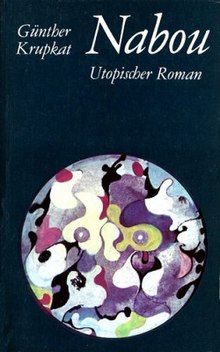Nabou
Appearance
 First edition | |
| Author | Günther Krupkat |
|---|---|
| Original title | Nabou |
| Cover artist | Peter Nagengast |
| Language | German |
| Genre | Science fiction novel |
| Publisher | Das Neue Berlin, Berlin |
Publication date | 1968 |
| Publication place | East Germany |
| Media type | Print (Hardcover & Paperback) |
Nabou is a 1968 science fiction novel by German author Günther Krupkat. Written as a sequel to his 1963 novel Als die Götter starben, Nabou narrates an expedition into the interior of the Earth.[1] A member of a research team investigating Earth's crust is revealed to be a biorobot, or "Biomat," left by an advanced spacefaring people called the Mejuans. The encounter between the humans and the alien representative is a comparative class encounter between advanced socialist aliens and human societies in a "lower stage" of development without open class conflict.[2] A 1989 survey ranks it as the 13th most popular East German science fiction novel.[3]
References
[edit]- ^ Fritzsche, Sonja (2006). Science Fiction Literature in East Germany. Oxford and New York: Lang. p. 114.
- ^ Fritzsche, Sonja (2006). Science Fiction Literature in East Germany. Oxford and New York: Lang. p. 114.
- ^ Steinmüller, Angela and Karlheinz (1995). Vorgriff auf das Lichte Morgen. Passau: Erster Deutscher Fantasy Club. p. 173.
Bibliography
[edit]- Fritzsche, Sonja. Science Fiction Literature in East Germany. Oxford; New York: Lang, 2006.
- Neumann, Hans-Peter. Die grosse illustrierte Bibliographie der Science Fiction in der DDR. Berlin: Shayol, 2002.
- Steinmüller, Angela and Karlheinz. Vorgriff auf das Lichte Morgen. Passau: Erster Deutscher Fantasy Club, 1995.
External links
[edit]- Nabou title listing at the Internet Speculative Fiction Database
